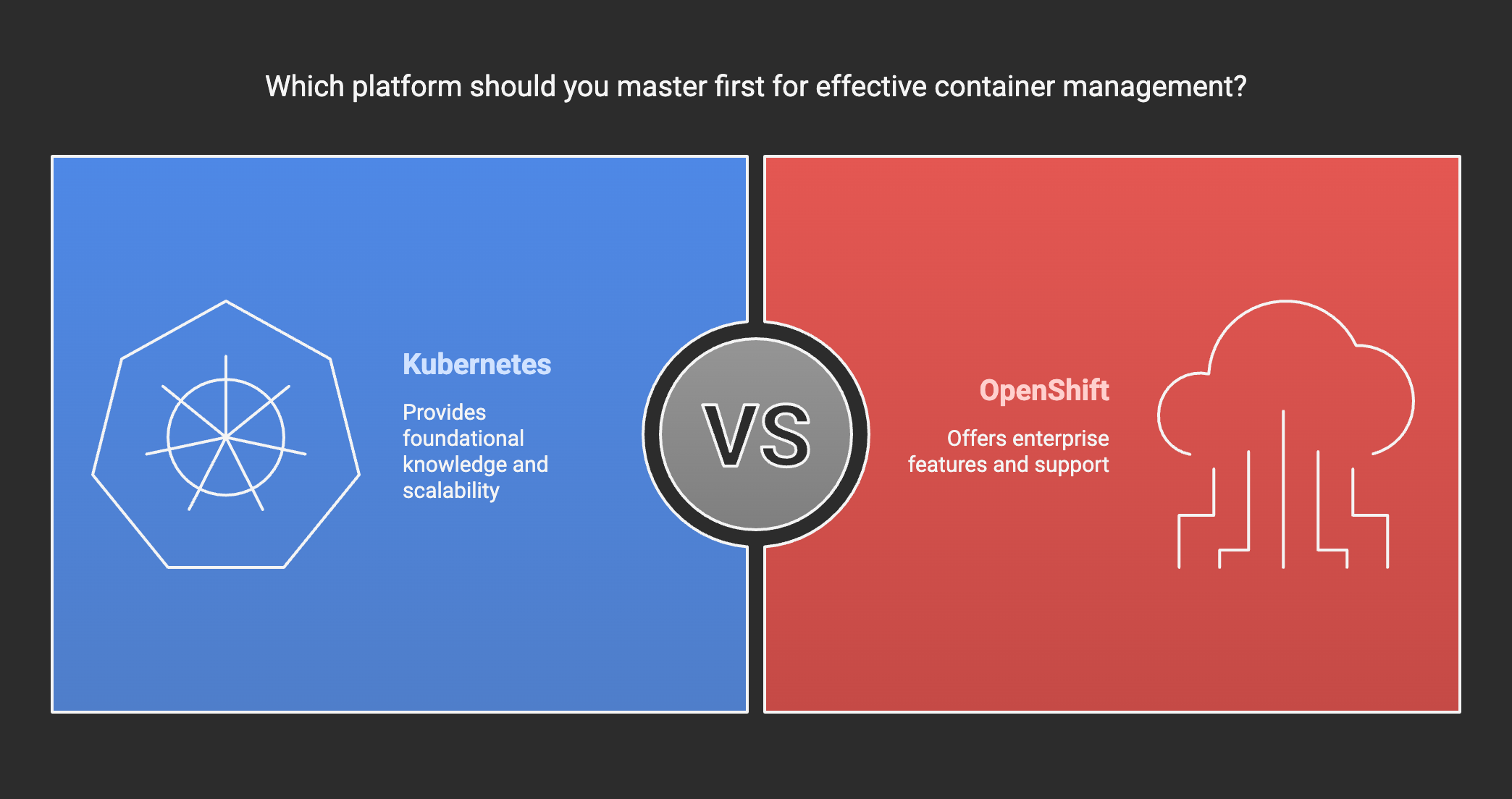Why You Should Learn Kubernetes Before Jumping into OpenShift
 Surender Aireddy
Surender Aireddy
In the ever-evolving world of DevOps and cloud-native technologies, Kubernetes and OpenShift have emerged as two of the most crucial tools for managing containerized applications. While both are integral to modern application development, they serve different purposes and cater to varying levels of complexity in deployment and management.
Kubernetes is a robust open-source platform designed to manage containerized applications at scale. On the other hand, OpenShift is a commercial-grade Kubernetes distribution provided by Red Hat, which adds enterprise-level features, tools, and support on top of Kubernetes. While OpenShift simplifies certain aspects of Kubernetes, it's fundamentally built on Kubernetes concepts and architecture.
Given this relationship, it’s essential to learn Kubernetes before diving into OpenShift. In this blog post, we’ll explore the reasons why mastering Kubernetes is a prerequisite for effectively using OpenShift, and how Benjamin Muschko’s CKA ( Certified Kubernetes Administrator ) course can help you build that foundational knowledge.
1. Understanding the Foundation: Kubernetes Concepts Are Core to OpenShift
OpenShift is essentially an enterprise wrapper around Kubernetes. It provides additional tools, dashboards, and features designed to make Kubernetes more accessible to developers and operations teams. However, without a solid understanding of Kubernetes, many concepts in OpenShift will remain opaque.
For example:
Pods : The smallest deployable unit in Kubernetes, pods are the building blocks of both Kubernetes and OpenShift.
Services and Networks : These are used to expose applications running in pods and manage their communication. In OpenShift, these concepts are extended with additional features like routes and load balancers.
Deployments and Replicasets : These ensure that your applications are always available by maintaining a certain number of pod replicas.
By learning Kubernetes first, you’ll understand the underlying mechanisms that make OpenShift work. This foundational knowledge will enable you to troubleshoot issues more effectively, customize configurations, and leverage advanced features in OpenShift.
2. Troubleshooting and Customization Requires Kubernetes Knowledge
OpenShift abstracts many of the complexities of Kubernetes by providing a user-friendly interface and pre-configured components. However, this abstraction layer can sometimes limit your ability to customize environments or debug issues when things go wrong.
For instance:
Suppose you encounter an issue where applications in OpenShift are not scaling as expected.
Without Kubernetes knowledge, you might struggle to understand why horizontal pod autoscaling (HPA) isn’t working.
With Kubernetes expertise, you’ll know how to check the underlying HPA configurations, resource limits, and node capacities to identify the root cause.
Similarly:
- If you need to customize your cluster’s behavior—for example, setting up custom resource definitions or integrating third-party tools—you’ll need a deep understanding of Kubernetes APIs and configuration mechanisms.
By mastering Kubernetes before using OpenShift, you’ll be better equipped to handle such scenarios, making you a more effective developer or administrator.
3. Kubernetes Is the Future: Learn It Anyway
Even if your goal is to work with OpenShift, learning Kubernetes is a skill that will always remain relevant in the DevOps landscape. Kubernetes has become the standard for container orchestration across cloud providers, and it’s used by millions of organizations worldwide.
Cross-Platform Compatibility : Whether you’re working with GKE (Google Kubernetes Engine), EKS (Amazon Elastic Container Service), or AKS (Azure Kubernetes Service), the core concepts remain consistent.
Job Market Demand : There is a high demand for skilled Kubernetes professionals. By learning Kubernetes, you’ll be positioning yourself as a valuable asset to any organization.
In contrast, OpenShift is specific to Red Hat and its ecosystem. While it’s an excellent tool for enterprise environments, it’s not as widely used outside of certain industries. Mastering Kubernetes will give you more flexibility in the job market and open doors to opportunities beyond OpenShift.
4. Benjamin Muschko’s CKA Course: The Perfect Companion
When it comes to learning Kubernetes, there’s no better resource than Benjamin Muschko’s Certified Kubernetes Administrator (CKA) course. Benjamin is one of the most respected figures in the Kubernetes community, and his CKA preparation material is widely regarded as the gold standard for anyone looking to master Kubernetes.
Here are some reasons why you should consider his course:
Comprehensive Coverage : The course covers all essential Kubernetes concepts, from deployment and networking to security and monitoring.
Real-World Scenarios : Benjamin uses practical examples and hands-on exercises to help you apply your knowledge in real-world scenarios.
Exam Preparation : If you’re aiming for the CKA certification, this course will give you the confidence and expertise needed to pass the exam.
Whether you’re planning to work with OpenShift or Kubernetes itself, Benjamin’s course is an invaluable investment in your career as a DevOps professional.
5. Conclusion: Start with Kubernetes, Then Move to OpenShift
In summary, learning Kubernetes before jumping into OpenShift is not just recommended—it’s essential. By mastering the fundamentals of Kubernetes, you’ll:
Build a strong foundation for understanding how OpenShift works.
Be better equipped to troubleshoot and customize your environments.
Future-proof your skills in an increasingly Kubernetes-driven world.
If you’re serious about becoming a DevOps professional or cloud engineer, start by investing time in learning Kubernetes. And for that journey, Benjamin Muschko’s CKA course is the perfect guide. With this knowledge in hand, you’ll be well-prepared to tackle OpenShift and any other container orchestration platform that comes your way.
Happy learning!
📚 O'Reilly: Certified Kubernetes Administrator (CKA) Study Guide
📚 O'Reilly: Certified Kubernetes Application Developer (CKAD) Study Guide, 2nd Edition
📚 Manning: Acing the Certified Kubernetes Administrator Exam
🎞️ LinkedIn Learning: Certified Kubernetes Administrator (CKA) Cert Prep: The Basics
🎞️ KodeKloud: CKA Certification Course – Certified Kubernetes Administrator
Subscribe to my newsletter
Read articles from Surender Aireddy directly inside your inbox. Subscribe to the newsletter, and don't miss out.
Written by
